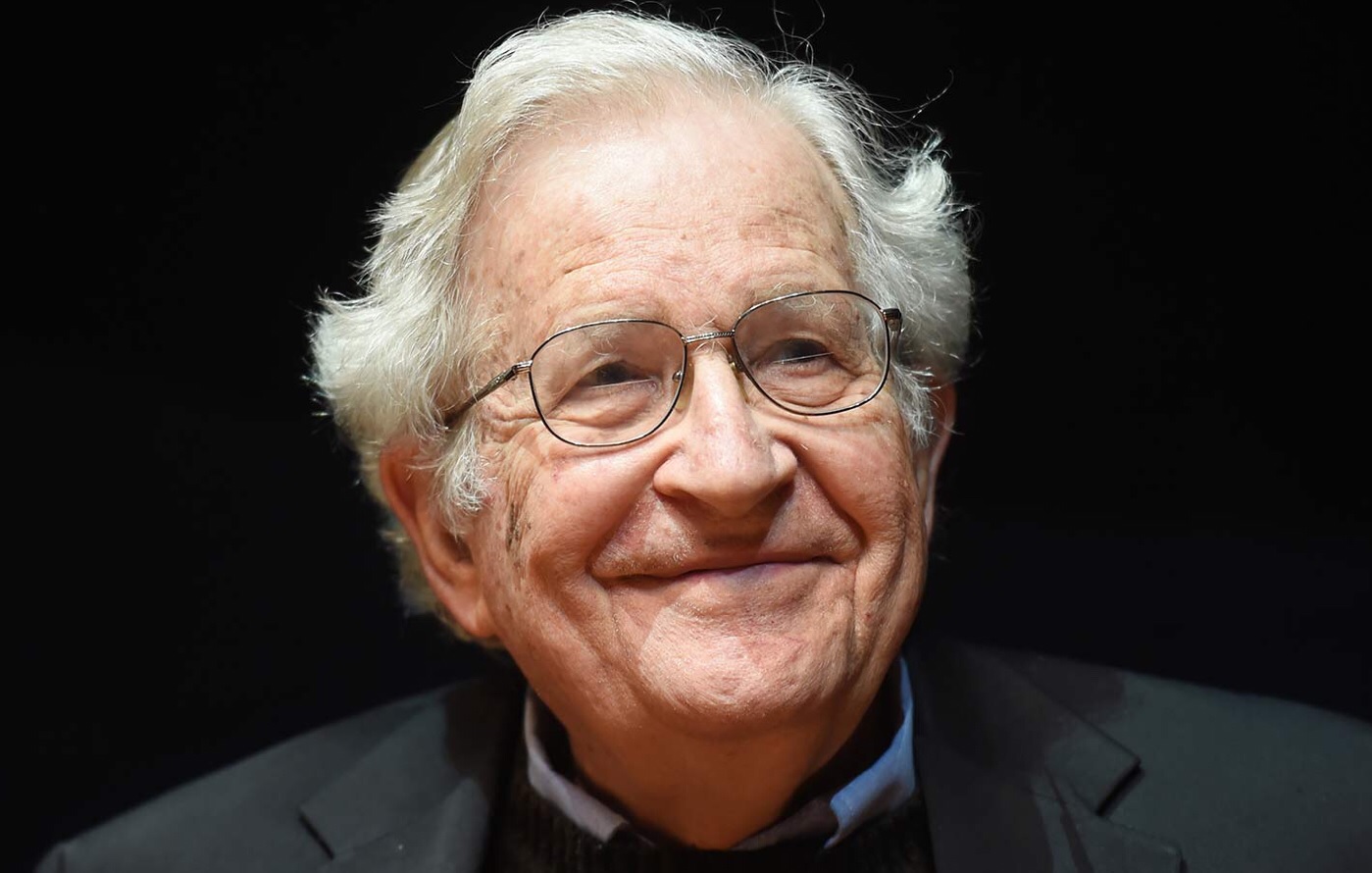
The invasion of Ukraine horrifies us. Because, like the war in the former Yugoslavia, it is so close: people fleeing and hiding in our regions; petrol and food costs skyrocketing; our armies mobilising. Putin horrifies us, because he is ready for anything: even a thermonuclear war that would exterminate life on the planet. Yet, bloody wars, for which the West has often been responsible, have distressed us less: the invasion of Afghanistan, the invasion of Vietnam, the invasion of Iraq, the Syrian civil war, to name but a few examples. Sun Tzu preached: don’t attack unless you know your enemy well; better an agreement than war; don’t start unless you are willing to do anything.
Exactly this is happening: Putin cannot end with a renunciation. He must go through with it, or he will be annihilated by his own people. The same applies to us Europeans: if Ukraine loses, we will be overwhelmed and blackmailed by Moscow for decades. Kiev must win at any cost. But Putin knows us well and knows that we are weak, divided and led by incompetent and ignorant politicians. Politicians who slavishly follow instructions from Washington and who do not understand (or pretend not to understand) Putin’s motives. And if we do not understand why, then we are doomed to lose. And this is where the words of Noam Chomsky help us.
Chomsky is the father of transformational generative grammar, a complicated expression to say that he, as a linguist, has tried to find the lowest common denominator of the earth’s languages, and to show it in comprehensible structures[1] . In his search for this philosopher’s stone of the human mind and soul, he has dealt with everything from politics to sociology, being, after the death of Karl Popper, the last of the great structuralists in a world in which hermeneutic aesthetics[2] increasingly dominates and, therefore, in politics, populism that is almost always anti-democratic: a development that Chomsky has been fighting for over half a century, first as an opponent of Richard Nixon (for which he was even arrested), and then as a liberal socialist philosopher[3].
At the age of 93, Chomsky experiences the new century as the dramatic defeat of all the ideals that have permeated his existence. That is why he continues to write like a river in flood, trying to warn the new generations of the dangers facing humanity as a whole. His latest book, of course, deals mainly with the invasion of Ukraine, its causes and possible consequences. A book that inspires fear in all those who have memories of the last world war and awareness of the extremely dangerous situation on planet Earth.
From ‘Special Operation’ to war on the West
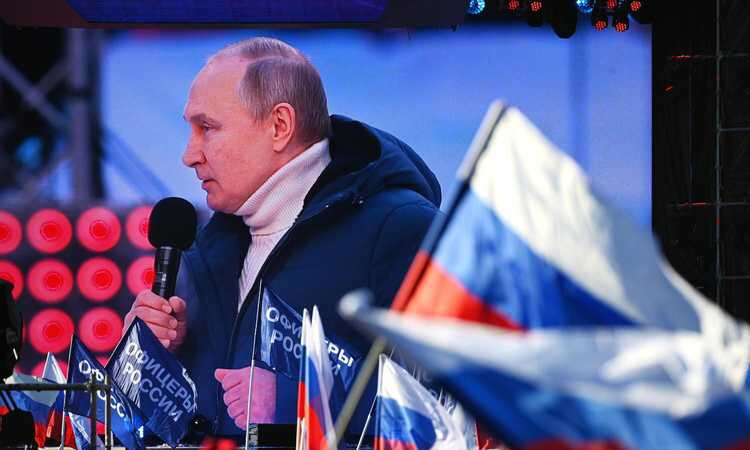
Vladimir Putin’s violent and lying propaganda[4]
On 24 February 2022, the world entered a new phase: Putin’s ‘Special Operation’ quickly turned into an attack on the West, whose hegemonic philosophy and power structure created when the Soviet empire dissolved is being undermined. Officially, the Russian military operation took everyone by surprise. Officially, the motive for the invasion is twofold: to protect its own security and to safeguard and protect the autonomous Russian-speaking minority in the Donbass. In reality, the real reasons for a conflict are never openly declared and public statements are mostly just propaganda[5].
As has been the case in all great wars since the Middle Ages, this propaganda is meant to convince the people of their own territory (whose sons are sent to the front to die) that the enemy is the aggressor. That is why in Russia today, anyone who argues a different thesis from that of the Kremlin, according to a Putin decree converted into law by the Duma, earns 15 years in prison[6], and Moscow’s thesis is that the invasion of Ukraine is a defensive manoeuvre against attacks prepared by NATO on the same basis as Hitler invaded the Soviet Union in 1940 to avoid an attack from the East[7].
In May 2022, when the accession of Sweden and Finland to NATO was formed, Kremlin spokesman Dmitry Peskov said: ‘We will take all necessary measures to ensure our security’ and the tenor of the reaction will depend ‘on the proximity of the Alliance’s infrastructure to the Russian borders’[8] . Foreign Minister Sergei Lavrov reiterated: ‘NATO wants to create a new front against Russia’[9]. Former Prime Minister Dmitry Medvedev concluded: ‘sending weapons to Kiev, equipping Ukrainian troops with Western equipment, sending mercenaries and organising exercises close to our borders increases the possibility of an open conflict between NATO and Russia, after the proxy war that the Alliance already conducts’ as ‘this kind of conflict always risks turning into a nuclear war’ with ‘catastrophic consequences for everyone’[10] .
Himself … when Medvedev was elected in 2008 with 70% of the vote[11] , the West hoped for a new era of détente and openness in Russia[12] . Today Medvedev himself utters open threats of thermonuclear war: ‘Any attempt to invade Crimea would be tantamount to a declaration of war against Russia. If a NATO member state were to make such a move, it would lead to a conflict against the entire North Atlantic Alliance: to World War III, to total disaster’[13] and, when speaking of the EU president, Ursula Von Der Leyen, he mockingly calls her the ‘European auntie’[14] . He is not only angry with her: commenting on a 16 June 2022 meeting in Kiev between Macron, Scholz and Draghi, he called them ‘frogs, sausages and spaghetti eaters’[15].
Also Medvedev said at the end of June, speaking about the sanctions and the investigations in Den Haag: ‘Trying to set up courts against the country with the largest nuclear potential is useless (…). This is a war of which large segments of the entire world population are victims, without access to the means to satisfy their basic needs. Let me repeat that, under certain circumstances, such hostile measures could be seen as an act of international aggression or even casus belli’[16] . And again: ‘The Union does not want to reduce the suffering of the Ukrainian people in any way: with sanctions it is only trying to push Russia towards financial catastrophe, but the catastrophe could happen in Europe, rather than in our country. The reasoning on Finland’s entry into NATO and the threats on the border follows the same pattern. You try to harm us, but you could become victims of your own actions’[17] .
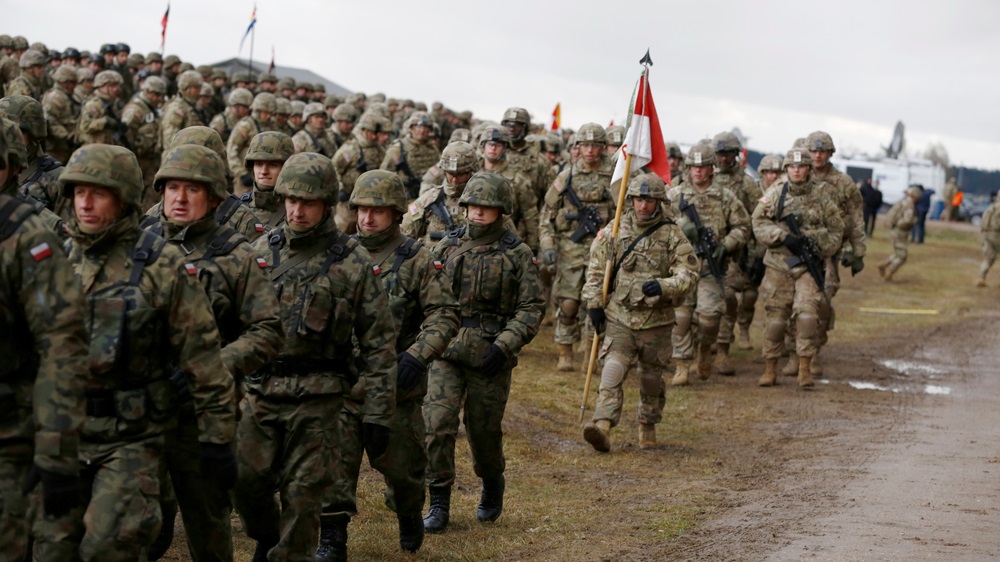
The Polish army leads the 300,000 troops deployed by NATO to defend the borders of Western Europe[18]
To this Kremlin propaganda, the West reacts with the beatification of President VolodymyrZelensky, who until the day of the invasion of Ukraine was considered a puppet of who knows which local oligarch. And, for that matter, in the West, even little Italy has in the past acted in the same way to justify the atrocities committed during its wars of conquest in Africa, as when, between 1935 and 1937 the Italian Air Force bombed the civilian population of East Africa with gas[19] – a war crime that historiography loves to forget – adopting a style that has served, for almost a century, to justify American wars of conquest and coups around the world promoted and supported in order to avoid a planetary victory of the ‘communist monster’[20] .
During the Second World War, the RAF, officially to avenge the British deaths caused by the ferocious Nazi bombing[21], ordered to sap the morale of the Germans and foment their hatred for Hitler the night-time destruction of German cities, killing almost only civilians, as in Hamburg (25 July-3 August 1943), causing 55,000 deaths[22], and in Dresden, when the war was over (13-14 February 1945), causing about 250,000 civilian deaths[23], thus acting according to the same logic that inspired the attack in Rome, in Via Rasella, on 23 March 1944, which killed a number of German reservists, so as to provoke the angry Nazi reaction, which resulted in the inhuman massacre of the fosse Ardeatine on 24 March 1944[24]; led the Americans to drop two atomic bombs on Hiroshima and Nagasaki and, later, with Operation Linebacker II[25] (18-29 November 1972) to cover schools, hospitals, civilian villages, aqueducts, factories of basic necessities, and common markets in Vietnam[26] with napalm, with consequences on the civilian population that are still being felt today[27]. And it is always the same logic used by NATO, without any UN mandate, to strike Serbia, officially to stop the massacre in Kosovo, in reality to prevent a Russian advance[28], killing 2500 civilians, including 89 children[29] . Or when we discover that the sanctions on Iraq in the 1990s caused the deaths of more than half a million children (as well as many adults)[30]
Chomsky does not discount anyone, and repeats, point by point, the list of misdeeds of which the West has been guilty since the end of the Second World War, pointing out that the clash is in the opposition between the imperialist policy of the United States and the imperialist policy of Russia, against the backdrop of an apolitical financial colonialism, with China as the target, which makes this a war that the West has already lost, Russia cannot win, and from whose outcome China will benefit, whatever the outcome.
A war that started long ago

The remains of Russian tanks on the road from the border to Kiev[31]
This war represents a cataclysmic event in world history. A war fought with mainly economic and media methods, which will bring about epochal changes. In his new book “Why Ukraine?”, based on a collection of interviews with Chomsky, the philosopher tries to find the deep roots of the conflict, without ideologically choosing to defend one side. The war in Ukraine is an ideological war, poisoned by ethnic prejudices, nationalist rhetoric, economic grudges, envy – a war with no holds barred, as when, on 11 May 2022, Ukraine blocked gas transfers on its territory in order to obtain greater commitment from Europe on the issues that bind Kiev and Brussels, which was followed by the Russian decision to cut supplies by half and, in July, to suspend them for a fortnight[32].
The European Union found itself rapidly losing further gas quotas for its needs and desperately searching for a solution, buying elsewhere, reopening discussions on nuclear and coal, suffering unprecedented inflationary increases, while accelerating renewable energy projects[33] . Officially, one point of contention is the Russian demand that Ukraine should not join the EU. According to Chomsky, however, this would play into the hands of everyone except the Europeans: because the current war is the direct consequence of the clash between Russia and the United States for reasons that do not concern us.
A clash, the latest act of which is the dispute over the doubling of the Nord Stream gas pipeline, which, once in operation, would further guarantee us the continuity of gas supplies, among other things at a good price, as it would further save Russia the passage taxes it currently pays to Ukraine, the Czech Republic and Slovakia, and which would exclude the United States from the European hydrocarbon market[34]. A clash that, starting in 2006, had been even more heated when ENI and Gazprom (and later also EDF and Wintershall) launched the South Stream project: a pipeline designed to bring Russian gas to Italy, and not only that, without crossing Ukraine, but passing through Bulgaria, Greece and Albania[35] . After the violent US attacks on Italian Prime Minister Silvio Berlusconi, who was too close to Putin[36] , the project was abandoned in 2014 due to strong US pressure on the Bulgarian government and Russia’s annexation of Crimea[37] .
The geopolitical centrality of Ukraine became obvious to everyone from the night of 18-19 February 2014, at the end of 20 days of popular uprising, which ended with JulijaTymoshenko’s speech in Maiden Square, Kiev[38] . A revolt that was only apparently spontaneous, born from the patient and silent work of many NGOs and facilitated by police repression, which caused, as is logical, both the interested condemnation of the international community and the call for a change of government[39] . According to the Russian point of view, which is absolutely understandable, that coup d’état overthrew a pro-Russian government to install a pro-American one and, as always, the world applauds, while the opposite operation is always branded a monstrosity: only those in favour of the West are allowed, permitted and recognised as an inalienable right[40]. It sounds banal, but it is the dynamic explained by EdoardoBennato’s ‘Arrivano i Buoni’[41].
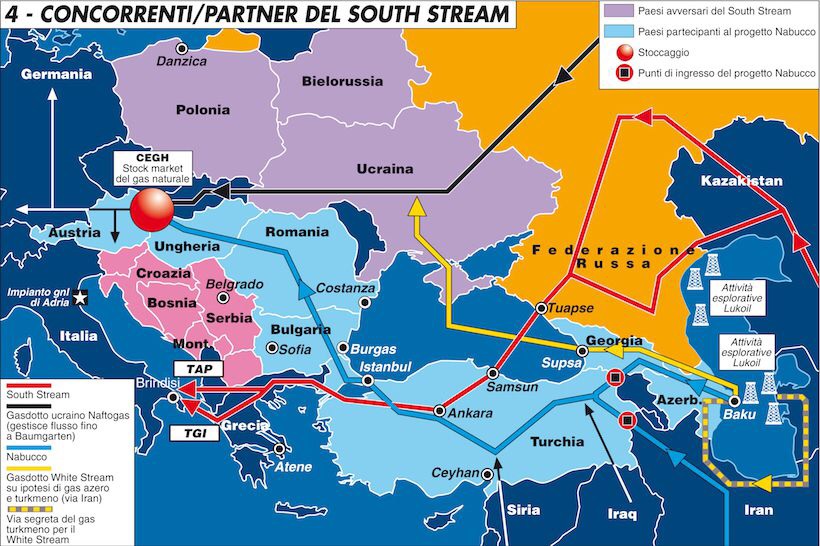
The South Stream gas pipeline project[42]
Behind this is the need to weaken Russia by any means possible: a strategy in which Ukraine, geographically, is in a key position[43]. When, in 2014, the invasion of Crimea did not resolve the situation, but instead worsened it, Moscow began to prepare for the next move, fiercer and clearer, accepting for the Russians the role of murderers that they have now, of course, conquered for generations, like the Germans of the Adolf Hitler era[44] . As for the 2014 uprising, those who witnessed those days at first hand tell of a military organisation made up of hospitals, canteens, tents, toilets, of militiamen in full camouflage who, uncovering the pavement, prepared stones and molotov cocktails for the protesters, of churchmen in bulletproof vests – a picture that, for the Kremlin, makes it absolutely clear that the popular uprising was organised and financed by the West[45] .
Pope Bergoglio made it clear: “Perhaps NATO’s barking at Russia’s door” led the Kremlin chief to “an anger that I cannot say whether it was provoked, but facilitated perhaps yes”[46]. A thesis that does not justify the invasion of Ukraine and the thousands of dead, but at least explains it and does not make Putin appear too simplistically as a raving madman, as former US Secretary of State Henry Kissinger[47] has repeatedly said and is widely supported by Noam Chomsky in his book: the philosopher, while condemning the Russian attack on Ukraine as a criminal act, stigmatises the aggressive policy of the United States and NATO of progressive encirclement of Russia in the absence of a real threat[48].
A policy that has a very serious weakness: since 2011, Russia has established itself as Europe’s leading energy exporter, beating out competition from Norway, Algeria and other Arab countries, as demonstrated by the failure of the current sanctions against Moscow. Europe has much to lose by continuing to adhere to Washington’s hard line with Moscow. Italy and Germany most of all. Berlin depends on Russian hydrocarbons for over 50% of its needs[49]. As for Italy, then, since 2014 Rome has also been the second largest exporter to Russia, and its industrial groups (ENEL, ENI, Leonardo/Finmeccanica, Indesit, Pirelli, UniCredit) have invested billions in the Russian market[50] .
On the subject of sanctions: cutting off trade with Russia has only favoured the shift of the volumes traded by Russia towards Asian countries and among these, first and foremost, towards China: hence the pragmatic considerations of the former US Secretary of State, Henry Kissinger, on the inappropriateness of the current NATO and US political conduct towards Moscow: a view also shared by Noam Chomsky[51] . According to Chomsky, Washington continues to treat Russia as it treated Libya or Iraq, without realising that the Russian Federation is part of the Shanghai Cooperation Organisation and a major military power[52].

12 September 1990: Foreign Minister Hans-Dietrich Genscher (left), Mikhail Gorbačëv (centre) and German Chancellor Helmut Kohl sign the so-called 4+4 contract, which provides for the unification of Germany[53]
Chomsky outlines the causes of the Russian invasion from an undeniable premise: ‘The invasion of Ukraine is a serious war crime’, but this does not absolve us from the task of understanding its motives. Putin has violated Article 2(4) of the UN Charter, which prohibits the threat or use of force against the territorial integrity of another state. Putin justifies himself by saying that those same violations of international law were repeatedly carried out by the US and its allies in Kosovo, Iraq, Libya and Syria[54] .
By quoting confidential documents, making the relations between Russia, the United States, NATO, the European Union and China comprehensible in their dynamics, Chomsky offers the reader what newspapers and TV rarely manage to offer: the possibility of understanding the deep reasons and stakes involved in the very serious crisis. What seems most implausible in light of the facts so far exposed by the official narrative is that the war in Ukraine seems to have come out of nowhere and is systematically recounted by the media in real time, but without allowing anyone to explain the complexity of the historical reasons. Such as the fact that, in the agreement signed by Kohl with Gorbačëv, and which led to the unification of the two Germanies, there was one indispensable condition: that NATO should not expand eastwards: in fact the only reason why the Soviet Union could make this concession[55].
That agreement had in fact been a promise from George Bush the father, James Baker and other top US leaders to Gorbačëv, against which nothing was written: the result was that NATO immediately moved towards East Germany[56], and then further still: ‘Under Clinton, NATO went further and further, step by step, to the Russian border. In 2008 it continued with Bush the son, and then again with Obama: there were proposals to bring Ukraine and Georgia into NATO’[57] . Yet. the Russian attitude towards the West was friendly until 1998, ‘they were willing to work with the US to build a new European security structure’, an attitude that changed due to the NATO attack on Serbia during the Kosovo War (1998-99)[58] .
In their arrogance, the Americans considered it irrelevant that Russia, with its back to the wall, would react violently and, economically and diplomatically, seek the friendship of the Chinese government: ‘The Atlantic Council calls the formation of the New Axis a “telluric shift in international relations” that underlies a “mind-boggling” project: The parties have agreed to create stronger ties between their economies through cooperation between China’s New Silk Road and Putin’s Eurasian Economic Union. They will work together on Arctic development. They will enhance coordination between multilateral institutions and in the fight against climate change’[59] .
Kissinger does not mince his words and advises the US administration to work so that the next post-war period will see ‘a European rather than an Asian Russia’ and in this perspective he emphasised that a military escalation in Crimea, where direct confrontation could even degenerate into a nuclear threat, should be avoided: ‘something Russia and the United States have never resorted to in 80 years, despite several military defeats on the ground. We must now avoid warlike actions that could escalate the conflict further”[60].
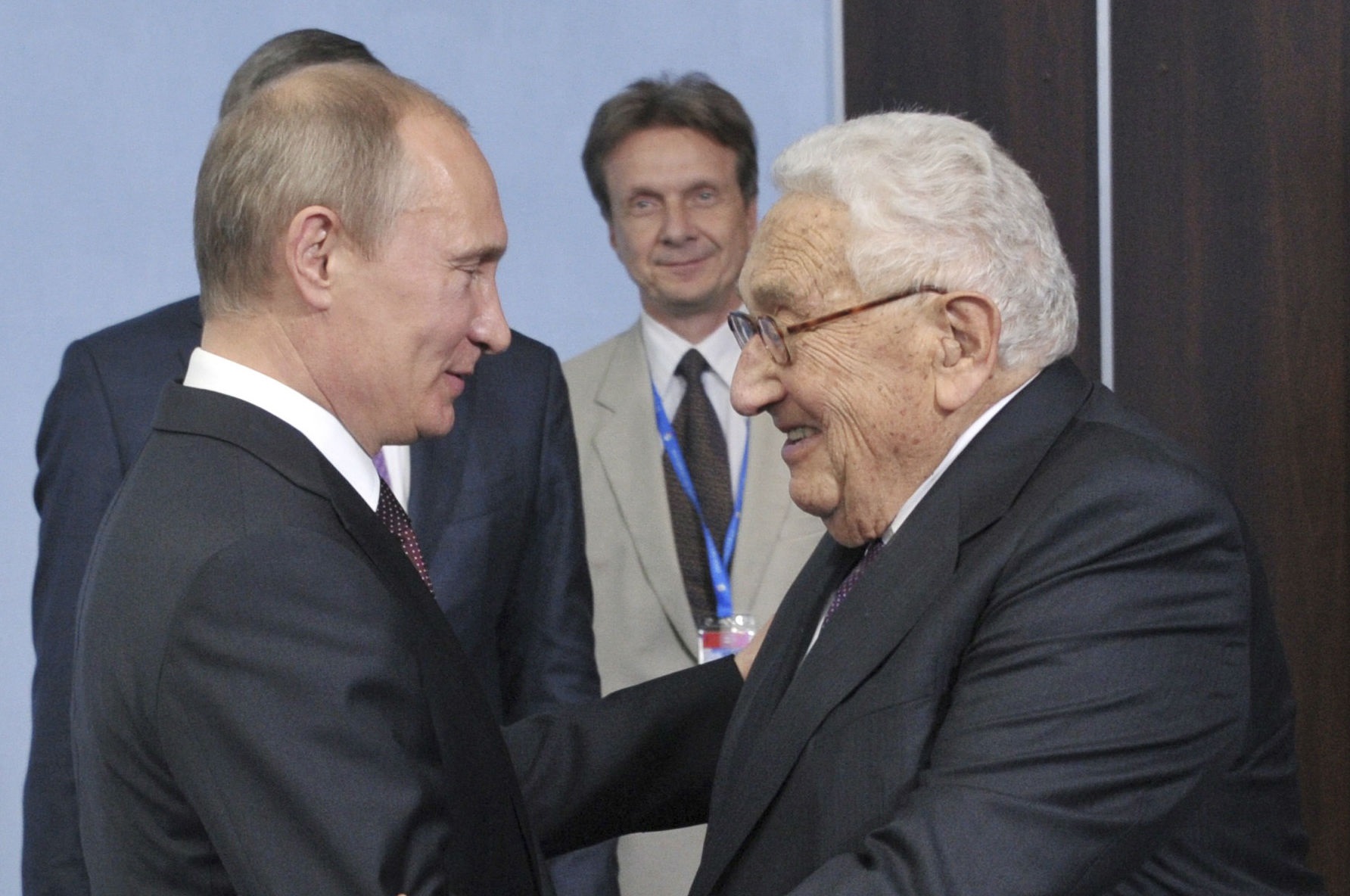
February 2016: the meeting between Vladimir Putin and Henry Kissinger, the director of the ‘strategy of tension’, with which the US sabotaged Western communist parties in the 1970s[61]
Kissinger is not soft on Kiev either: it is the invasion of Ukraine and not Russia as such that must be defeated – ‘not only should Kyiv come down on more lenient terms and agree to make territorial concessions, but Western countries must also avoid making the ‘fatal’ mistake of getting carried away ‘by the mood of the moment’ and alienating Russia forever. Ukraine must negotiate ‘before creating upheavals and tensions that are unlikely to be overcome’ and ideally return to the status quo before the invasion: ‘Continuing to wage war beyond that point would no longer have anything to do with Ukraine’s freedom, but would be a new war against Russia’[62]. He added: ‘Let’s avoid repeating the same mistake with Taiwan, stigmatising President Biden’s declaration of US readiness to intervene in support of Taiwan should it be attacked by China[63] .
According to Kissinger, “the United States should not develop by subterfuge a policy that endorses the ‘two Chinas’ solution, but rather insist on a policy of patience”[64]. These positions are not in line with the mood of the moment, reiterated in Chomsky’s book: ‘Meanwhile, the dilemma of what to do with NATO remained. Since its formation, the theoretical justification for NATO was the defence of Western Europe against a Russian attack. We can ask ourselves how realistic it was, how sincere it was. I think not entirely. Much of it was fictional. But whatever we may think, that was the official justification. In any case, in 1991 that justification fell apart: a Russian attack on Western Europe was no longer conceivable. Today it makes a comeback, but it is the consequence of NATO’s expansion to the Russian borders, (…) which in practice amounts to bringing back the kind of confrontations that were buried in the past. In any case, the question of what to do with NATO remained in 1991. The logical conclusion should have been that it should be dissolved: its official justification no longer existed. Instead, it was enlarged and not only territorially but also in its mission. NATO’s official mission was modified to become global in scope, not just confrontation with Russia’[65] .
Chomsky goes further and argues that, today, “NATO’s existence is justified by the need to manage the threats caused by its enlargement”, something Chomsky calls “a plausible judgement”[66] . In the third chapter he adds: “What is at stake in this crisis does not only involve Ukraine, but the future of freedom” [67]. And again: ‘Official doctrine dictates that we confront the very serious threat posed by China and maintain a firm stance on Ukraine, while Europe falters and Ukraine asks us to tone down and seek the path of diplomacy’[68]. a path that Washington has apparently refused to follow because of ‘its dedication to what is right, even if it is almost completely isolated, as when it nobly invades Iraq and strangles Cuba despite near-unanimous international opposition, to take just two of many examples’[69] .
Chomsky is not alone. The important geopolitical magazine ‘Limes’ also hits the same buttons: ‘In Ukraine the conditions are in place for a war between NATO and Russia, which is still perfectly avoidable. The expansion of the Atlantic Alliance is the main cause of the clash. Liberal idealism drives the US to adventure. The premise is disturbing: the world’s major leaders are doing all they can to create confusion and insecurity and the minor ones add their own by moving like puppets from one side of the stage to the other. US President Biden now relies on rhetoric, continuing to fuel the already dangerous fire with apocalyptic statements and inconsistent actions from Europe to the Pacific. His European and Asian figureheads prance around him posing as mediators, carriers of brilliant ideas and ingenious solutions that serve only to fill the five minutes of media space reserved for them. All they can do is repeat what the big three have already said to each other, and if they invent something, they are immediately reprimanded’[70]. all the while “Russian President Putin speaks little, chuckles, does not make empty threats let alone begs, he has made demands and waited for answers, letting his military move in force all along the European border and intervene directly or by proxy in the areas he cares most about. As in Kazakhstan, the Crimea and the Donbas’[71].

So far, the only casualty of the sanctions imposed on Russia is the bankruptcy of the German energy giant Uniper, which must now be taken over by the state or close its doors and lay off 12,000 employees[72]
Chomsky explains: what no one has yet wanted to admit, is that NATO has turned into a structure to ensure the United States of America’s control of the world’s energy resources, as well as to ensure US support in various special operations and ‘peace missions’[73] . For this reason, even though “in Ukraine the basic points of a solution are well known on all sides, as has been repeatedly said”[74] as “the optimal outcome for the security of Ukraine (and the world) would be the kind of Austro-Scandinavian neutrality that prevailed during the Cold War years, offering the opportunity to be part of Western Europe in any form desired and in any respect except for providing the US with military bases that would be a threat to those countries as well as to Russia’, the development of the Ukraine crisis continues in a tug-of-war between Moscow and Washington in which Brussels is forced to obey without question[75]. Moreover, with the knowledge that, regardless of the war, ‘Ukraine will not join NATO in the foreseeable future’[76] .
British political analyst AnatolLieven believes that “The whole question of Ukraine joining NATO is actually purely theoretical, so in a sense the whole argument is based on nothing. On both sides, it has to be said: Russian as well as Western’[77] . In this regard, Chomsky writes that ‘this observation brings to mind Jorge Luis Borges’ description of the Falklands/Malvinas War: two bald men arguing over a comb. Russia cites security concerns. For the US, it is a matter of high principles: one cannot violate the sacred right to national sovereignty, hence the right to join NATO, which Washington knows will not happen’[78] . A position, let us be clear, also shared by Ukrainian President Zelensky[79].
The same goes for Ukraine’s entry into the EU: there is a lot of talk about it, but it is only the acceptance of the candidature, as actual entry is in fact unfeasible, because it would drag the EU into war[80]. Political analyst Alessandro Marrone explains: “if the EU did not enter a war on behalf of one of its members out of fear of Russian conventional or nuclear power, or simply out of unwillingness to bear the corresponding losses, that same political commitment between members of the Union would suffer a mortal blow, and the cohesion and stability of the EU itself would be at stake since, among other things, the current institutional and political mechanisms of security, solidarity and internal cohesion are not designed for and are not adequate for a territorial dispute and potential conflict of the Union with a conventional and nuclear power such as Russia”[81] .
If, on the other hand, Ukraine were part of the Union, and we were to enter the war,’ Marrone continues, ‘the European Union itself could not automatically count on direct NATO military intervention, since Ukraine is not and will not be a member of the Atlantic Alliance, and the same reasons have led the United States and other allies not to intervene directly in the current conflict (…). This would be the greatest strategic and geopolitical victory for a Russian leadership in opposition to the West”[82] . The thing, therefore, would become a boomerang for NATO itself and the US leadership in Europe, which would lose its meaning and validity: Puntin’s attack, apparently unconscious and weak in terms of the means and men employed in the action, is the fruit of strategic planning down to the tiniest detail that relies on sanctions, which have weakened the West, NATO and Europe in the short but above all in the medium-long term.
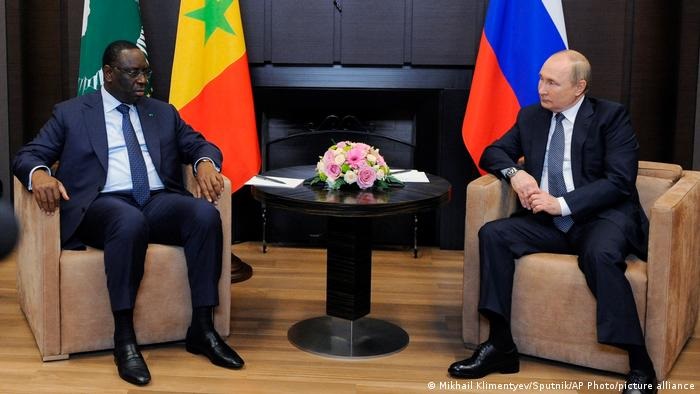
2 June 2022: African Union (and Senegal) President MackySall argues that the real victims of the war in Ukraine are African countries, left alone in an unprecedented famine and energy collapse[83]
Chomsky points out: ‘For Washington, the issue is deeper’ to the point that even ‘a regional arrangement would pose a serious threat to the global status of the United States. This concern has been simmering since the Cold War years: is it possible for Europe to acquire an independent role in international affairs (and it would be possible) perhaps following the Gaullist vision of a Europe from the Atlantic to the Urals, later taken up in 1989 by Gorbačëv with his idea of a ‘common European house’, of a ‘vast economic space from the Atlantic to the Urals’? Even more unthinkable would be Gorbačëv’s further enlarged vision of a Eurasian security system from Lisbon to Vladivostok without military blocs: a proposal that was rejected out of hand during the negotiations conducted thirty years ago to seek a post-Cold War accommodation” this because the primary interest of the United States is to “preserve the Atlanticist order in Europe, in which the United States reigns supreme”[84].
On closer inspection, therefore, ‘the domino theory, often rejected with derision, has never been abandoned because it is an important instrument of state power. The question arises again today with respect to a possible regional solution to the Ukrainian conflict’ and ‘more or less the same applies to friction with China’[85] . A China which, today, is the only force capable of stopping the war but which, according to Chomsky, is not at all interested in doing so: ‘China might try to take on this role, but it does not seem likely. Chinese analysts know as well as we do that there has always been a way to avoid catastrophe (…). They also realise that no matter how slim the options have become, it would still be possible to concede Putin’s ‘real target’ in a way that would be beneficial to everyone, without violating fundamental rights. And they also know that the US government is not interested, nor is the nomenklatura of opinion-makers. They may be disinclined to enter the fray. It is unclear whether China even wants to. Keeping out of the conflict benefits it. It is continuing to integrate much of the world into the Chinese-led investment and development system, and Turkey, a NATO member, is likely to be next on the list. China also knows that the global South does not look favourably on the ‘wiping out of Mother Russia’ and would prefer to keep its relationship with Moscow: ‘The South may certainly share the horror at the cruelty of the invasion, but its experiences are not those of Europe and the US. The countries in that area, after all, are the historical targets of the brutalities of Europe and the United States, against which Ukraine’s suffering loses weight. These experiences and memories, after all, are also shared by China with the ‘Century of Humiliation’ and so on. If the West chooses not to see this, China certainly does. I assume it will keep its distance and proceed along its current course’ [86].
What emerges, then, incontrovertibly from the pages of ‘Why Ukraine’ is that Russia’s position is very clear: Putin cannot accept Georgia and Ukraine joining NATO, hosting NATO military exercises and being militarised by NATO, and, on the other hand, if something like this happened in Mexico with Russian or Chinese armed forces it would be equally unacceptable to the US[87] : “a constructive programme”, necessary to resolve the crisis, would have to be “antipodal to the Joint Statement on the US-Ukraine Strategic Partnership[88] signed by the White House on 10 September 2021. In this document, which has received little media coverage, it strongly declares that the door to Ukraine’s NATO membership is open. It also ‘sets out the Strategic Defence Framework that lays the foundation for strengthening strategic defence and security cooperation between the United States and Ukraine’, providing Ukraine with advanced anti-tank and other weapons as well as an ‘intensive training and exercise programme consistent with Ukraine’s status as a NATO Enhanced Opportunities Partner’. This statement is yet another act aimed at hitting the bear in the face. It is another step in a process that NATO (i.e. Washington) has perfected since Bill Clinton’s 1998 breach of the firm promise made by George H.W. Bush not to expand NATO eastwards’[89] .
But now the guns speak. So many people are dying, entire regions are being completely destroyed, millions have left their homeland and are now forced to try to rebuild their existence elsewhere. The world, which should have been dealing with an environmental crisis that, this summer, is not only showing its fierce face for the first time, but is destroying entire nations, is instead in a recession unparalleled since the beginning of the industrial revolution. The achievements of well-being, but also of human rights, become luxury goods, not least because of the pandemic, which no one talks about any more, but which continues to mow down tens of thousands of lives. And, as Chomsky also argues, in the end the deal will be the one that could have been done without so much bloodshed.
[1]Works of Noam Chomsky on Linguistics: Current Issues in Linguistic Theory (1964), Aspects of the Theory of Syntax (1965), The Sound Pattern of English (with Morris Halle, 1968), Language and Mind (1972), Studies on Semantics in Generative Grammar (1972), and Knowledge of Language (1986);
[2]Structuralism argues that in the empirical sciences (linguistics, sociology, cultural anthropology, ethnology, psychology, economy) we can catalogue what happens and what we perceive, but we cannot explain its nature, nor can we draw up a catalogue of intrinsic and immutable rules. Aesthetics and hermeneutics, on the other hand, believe that mankind pursues the beautiful, and that beauty is not only predictable, but also the object of teaching – and therefore subject to ineluctable and eternal rules. The main structuralists have been Roland Barthes, Karl Popper, Edmund Husserl: https://www.zvab.com/servlet/BookDetailsPL?bi=30991434473&cm_mmc=ggl-_-ZVAB_Shopp_Rare-_-naa-_-naa&gclid=Cj0KCQjw2_OWBhDqARIsAAUNTTEZ8d7U6sOwQKo7ofpAosf3UYgs2Rmo0uDTlDpkHBtTS3NUMPOLkT0aAlWKEALw_wcB ;
[3]https://it.wikipedia.org/wiki/Noam_Chomsky
[4]https://www.primaonline.it/2022/03/21/347932/putin-e-la-potente-macchina-propagandistica-che-stravolge-la-realta/
[5]https://www.primaonline.it/2022/03/21/347932/putin-e-la-potente-macchina-propagandistica-che-stravolge-la-realta/
[6]https://ilmanifesto.it/russia-da-operazione-speciale-a-guerra-contro-loccidente
[7]https://ilmanifesto.it/russia-da-operazione-speciale-a-guerra-contro-loccidente
[8]https://ilmanifesto.it/russia-da-operazione-speciale-a-guerra-contro-loccidente
[9]https://www.corriere.it/esteri/22_aprile_14/medvedev-ex-presidente-russo-putin-2fb2e96a-bb84-11ec-818b-cbb6b2b517fa.shtml
[10]https://ilmanifesto.it/russia-da-operazione-speciale-a-guerra-contro-loccidente
[11]https://www.limesonline.com/cartaceo/putin-medvedev-la-strana-coppia-alla-prova-della-crisi
[12]https://www.corriere.it/esteri/22_aprile_14/medvedev-ex-presidente-russo-putin-2fb2e96a-bb84-11ec-818b-cbb6b2b517fa.shtml
[13]https://www.open.online/2022/06/28/russia-medvedev-nato-crimea/
[14]https://ilmanifesto.it/russia-da-operazione-speciale-a-guerra-contro-loccidente
[15]https://www.open.online/2022/06/17/russia-medvedev-vs-ursula-von-der-leyen/
[16]https://www.open.online/2022/06/30/guerra-russia-ucraina-medvedev-tribunali-nucleare/
[17]https://ilmanifesto.it/russia-da-operazione-speciale-a-guerra-contro-loccidente
[18]https://www.theguardian.com/world/2022/jun/27/nato-300000-troops-high-alert-russia-threat-ukraine ; https://www.aljazeera.com/news/2022/7/18/polands-nato-role
[19]http://www.criminidiguerra.it/bombardagas.shtml ; Del Boca I gas di Mussolini, Editori riuniti, pag. 118 e seg. ; https://www.reteparri.it/wp-content/uploads/ic/RAV0053532_1998_211-213_12.pdf ; https://iris.unica.it/bitstream/11584/68434/1/La%20costruzione%20dell%27impero%20fascista.pdf
[20]https://elearning.unipd.it/spgi/pluginfile.php/161797/mod_resource/content/1/Punizione%20criminali%20di%20guerra%20italiani.doc
[21]https://www.storiologia.it/aviazione2/harris.htm
[22]“In the summer of 1943, the Royal Air Force, with the support of the US 8th Air Fleet, began a series of raids on Hamburg. The operation was code-named ‘Gomorrah’. It was aimed at completely destroying the German city, considered by the Allies to be a target of high strategic value. On the night of 28 July alone, more than 2,300 tons of explosive and incendiary bombs were dropped on Hamburg. The methodology was already tried and tested: first disruptive bombs to break windows and building entrances, then simultaneous fragments and phosphorous incendiary bombs to burn roofs and set fire to basements. Particular effects were generated as the large quantity of incendiary bombs caused a strong updraft of hot air while colder air from the periphery poured into the interior of the burning area; in short, the thousands of fires merged into a single ‘firestorm’ that reached extremely high temperatures. (The next day) on some horribly mangled bodies the blue flames of phosphorus still flickered.”(W.G. Sebald, Storia Naturale della distruzione, Adelphi editore) http://www.nonsolobush.it/page3.php
[23]https://www.ilpost.it/2020/02/13/bombardamento-dresda/
[24]https://www.ilfattoquotidiano.it/2020/01/11/lattentato-di-via-rasella-fu-discutibile-ma-la-foga-polemica-contro-il-pci-e-eccessiva/5645401/; “Attentato e rappresaglia. Il PCI e via Rasella”, Alberto ed Elisa Benzoni, 1999
[25]https://www.ilgiornale.it/news/cultura/lultima-grande-offensiva-dei-bombardieri-nel-disastro-usa-2016508.html
[26]https://web.archive.org/web/20120327165141/http:/chamsocsuckhoe.org/TuDien/ChiTietBenhVien/tabid/138/IDHospital/1277/Default.aspx ; https://www.sanitainformazione.it/mondo/bombe-al-fosforo-cosa-sono-e-perche-fanno-cosi-paura/ ; https://www.difesa.it/SMD_/CASD/IM/CeMiSS/Pubblicazioni/ricerche/Documents/Ricerche_2013/Sociologia_Militare/Rapporto_finale_Disarmo.pdf page18; http://web2.ba.infn.it/~cufaro//political/Sapere_Mine_1997.pdf ; https://www.sanitainformazione.it/mondo/bombe-al-fosforo-cosa-sono-e-perche-fanno-cosi-paura/ ; http://web2.ba.infn.it/~cufaro//political/Sapere_Mine_1997.pdf ; http://www.icsm.it/articoli/ri/daisy.html
[27]https://www.arezio.it/notizia/lagente-defoliante-orange-continua-ad-inquinare-il-vietnam-it/
[28]https://www.agi.it/estero/news/2022-03-24/quando-nato-decise-colpire-serbia-fermare-massacro-kosovo-16121154/
[29]https://www.agi.it/estero/news/2022-03-24/quando-nato-decise-colpire-serbia-fermare-massacro-kosovo-16121154/
[30]http://www.coe.int/it/web/compass/war-and-terrorism
[31]https://www.ukrinform.net/rubric-ato/3435654-russias-losses-in-ukraine-almost-15000-troops-500-tanks-and-100-aircraft.html
[32]https://ilmanifesto.it/russia-da-operazione-speciale-a-guerra-contro-loccidente ; https://www.open.online/2022/05/11/ucraina-zelensky-sanzioni-gas-russia-video/
[33]https://www.open.online/2022/05/11/ucraina-zelensky-sanzioni-gas-russia-video/ ; https://www.open.online/2022/05/11/gas-russia-italia-stop-ucraina-cosa-succede/
[34]https://it.euronews.com/2019/12/21/nord-stream-2-il-gasdotto-della-discordia-germania-e-russia-contro-trump
[35]https://st.ilsole24ore.com/art/notizie/2014-12-01/putin-russia-abbandona-progetto-gasdotto-south-stream–204015.shtml?uuid=AB1gsVKC&refresh_ce=1 ;
[36]https://formiche.net/2016/02/wikileaks-intercettazioni-italia-usa-berlusconi/
[37]https://st.ilsole24ore.com/art/notizie/2014-12-01/putin-russia-abbandona-progetto-gasdotto-south-stream–204015.shtml?uuid=AB1gsVKC&refresh_ce=1
[38]http://www.vita.it/static/upload/cri/crisi-ucraina-.pdf
[39]https://nuovoeutile.it/wp-content/uploads/2012/12/FDTD_Italian.pdf ; http://www.vita.it/static/upload/cri/crisi-ucraina-.pdf
[40]https://nuovoeutile.it/wp-content/uploads/2012/12/FDTD_Italian.pdf ; http://www.vita.it/static/upload/cri/crisi-ucraina-.pdf
[41]https://www.youtube.com/watch?v=52MCXluo9Co
[42]https://www.limesonline.com/concorrentipartner-del-south-stream/635
[43]https://tesi.luiss.it/13038/1/schito-marco-tesi-2014.pdf
[44]http://www.vita.it/static/upload/cri/crisi-ucraina-.pdf
[45]http://www.vita.it/static/upload/cri/crisi-ucraina-.pdf
[46]https://www.repubblica.it/esteri/2022/06/13/news/cosi_lequilibrio_del_vaticano_sulla_guerra_in_ucraina_tiene_aperto_un_canale_diplomatico_con_mosca-353734119/
[47]https://www.ilfoglio.it/esteri/2022/05/25/news/kissinger-e-chomsky-pur-detestandosi-sono-contrari-al-sostegno-americano-all-ucraina-4036403/ ; https://www.repubblica.it/esteri/2022/06/28/news/kissinger_su_guerra_ucraina_russia_trattare_con_putin-355745140/
[48]https://www.youtube.com/watch?v=dCVN7iV5kVo
[49]https://www.linkiesta.it/2022/04/germania-dipendenza-gas-russo/
[50]https://www.exportplanning.com/magazine-italia/article/2022/03/02/relazioni-commerciali-italo-russe-stato-attuale-e-prospettive/
[51]https://www.youtube.com/watch?v=dCVN7iV5kVo
[52]https://www.youtube.com/watch?v=dCVN7iV5kVo
[53]https://www.mdr.de/geschichte/kohl-gorbatschow-verhandlungen-kaukasus-100.html
[54]“Perché l’Ucraina” Cap. 4 https://truthout.org/articles/noam-chomsky-us-military-escalation-against-russia-would-have-no-victors/
[55]“Perché l’Ucraina”, cap. 1
[56]“Perché l’Ucraina”, cap. 1
[57]“Perché l’Ucraina”, cap. 1
[58]https://www.youtube.com/watch?v=dCVN7iV5kVo
[59]“Perché l’Ucraina”, cap. 3 https://truthout.org/articles/chomsky-us-push-to-reign-supreme-stokes-the-ukraine-conflict/
[60]https://quifinanza.it/editoriali/video/svolta-reintegrare-russia-europa-rivelazione-kissinger/654324/
[61]https://www.atlanticcouncil.org/blogs/ukrainealert/kissinger-s-vapid-vision-thing/
[62]https://www.ilfoglio.it/esteri/2022/05/25/news/kissinger-e-chomsky-pur-detestandosi-sono-contrari-al-sostegno-americano-all-ucraina-4036403/
[63]https://www.ilfoglio.it/esteri/2022/05/25/news/kissinger-e-chomsky-pur-detestandosi-sono-contrari-al-sostegno-americano-all-ucraina-4036403/
[64]https://www.ilfoglio.it/esteri/2022/05/25/news/kissinger-e-chomsky-pur-detestandosi-sono-contrari-al-sostegno-americano-all-ucraina-4036403/
[65]“Perché l’Ucraina”, cap. 1
[66]“Perché l’Ucraina”, cap. 2 https://truthout.org/articles/us-approach-to-ukraine-and-russia-has-left-the-domain-of-rational-discourse/
[67]“Perché l’Ucraina”, cap. 3 https://truthout.org/articles/chomsky-us-push-to-reign-supreme-stokes-the-ukraine-conflict/
[68]“Perché l’Ucraina”, cap. 3 https://truthout.org/articles/chomsky-us-push-to-reign-supreme-stokes-the-ukraine-conflict/
[69]“Perché l’Ucraina”, cap. 3 https://truthout.org/articles/chomsky-us-push-to-reign-supreme-stokes-the-ukraine-conflict/
[70]https://www.limesonline.com/cartaceo/la-via-verso-il-disastro
[71]“Perché l’Ucraina”, cap. 3 https://truthout.org/articles/chomsky-us-push-to-reign-supreme-stokes-the-ukraine-conflict/
[72]https://www.rnd.de/politik/uniper-in-der-krise-bundesregierung-will-zeitnah-helfen-3GPFU2G7UHJCVVDWYCQ4G5KG7Y.html
[73]“Perché l’Ucraina”, cap. 3 https://truthout.org/articles/chomsky-us-push-to-reign-supreme-stokes-the-ukraine-conflict/
[74]https://truthout.org/articles/chomsky-outdated-us-cold-war-policy-worsens-ongoing-russia-ukraine-conflict/
[75]“Perché l’Ucraina”, cap. 3 https://truthout.org/articles/chomsky-us-push-to-reign-supreme-stokes-the-ukraine-conflict/
[76]“Perché l’Ucraina”, cap. 3 https://truthout.org/articles/chomsky-us-push-to-reign-supreme-stokes-the-ukraine-conflict/
[77]“Perché l’Ucraina”, cap. 3 https://truthout.org/articles/chomsky-us-push-to-reign-supreme-stokes-the-ukraine-conflict/ ; https://www.democracynow.org/2022/2/7/ukraine_years_of_conflict_with_russia
[78]“Perché l’Ucraina”, cap. 3 https://truthout.org/articles/chomsky-us-push-to-reign-supreme-stokes-the-ukraine-conflict/
[79]https://www.startmag.it/mondo/ucraina-nato-zelensky/
[80]https://www.affarinternazionali.it/pericoli-e-svantaggi-adesione-ucraina-ue/
[81]https://www.affarinternazionali.it/pericoli-e-svantaggi-adesione-ucraina-ue/
[82]https://www.affarinternazionali.it/pericoli-e-svantaggi-adesione-ucraina-ue/
[83]https://www.france24.com/en/africa/20220603-african-union-head-tells-putin-africans-are-victims-of-ukraine-conflict
[84]“Perché l’Ucraina”, cap. 3 https://truthout.org/articles/chomsky-us-push-to-reign-supreme-stokes-the-ukraine-conflict/
[85]“Perché l’Ucraina”, cap. 3 https://truthout.org/articles/chomsky-us-push-to-reign-supreme-stokes-the-ukraine-conflict/
[86]“Perché l’Ucraina” Cap. 5 https://truthout.org/articles/noam-chomsky-a-no-fly-zone-over-ukraine-could-unleash-untold-violence/
[87]“Perché l’Ucraina” Cap. 7 https://truthout.org/articles/chomsky-lets-focus-on-preventing-nuclear-war-rather-than-debating-just-war/
[88]https://www.whitehouse.gov/briefing-room/speeches-remarks/2021/09/01/remarks-by-president-biden-and-president-zelenskyy-of-ukraine-before-bilateral-meeting/ ; https://www.whitehouse.gov/briefing-room/statements-releases/2021/09/01/joint-statement-on-the-u-s-ukraine-strategic-partnership/ ;
[89]“Perché l’Ucraina” Cap. 7 https://truthout.org/articles/chomsky-lets-focus-on-preventing-nuclear-war-rather-than-debating-just-war/
Leave a Reply